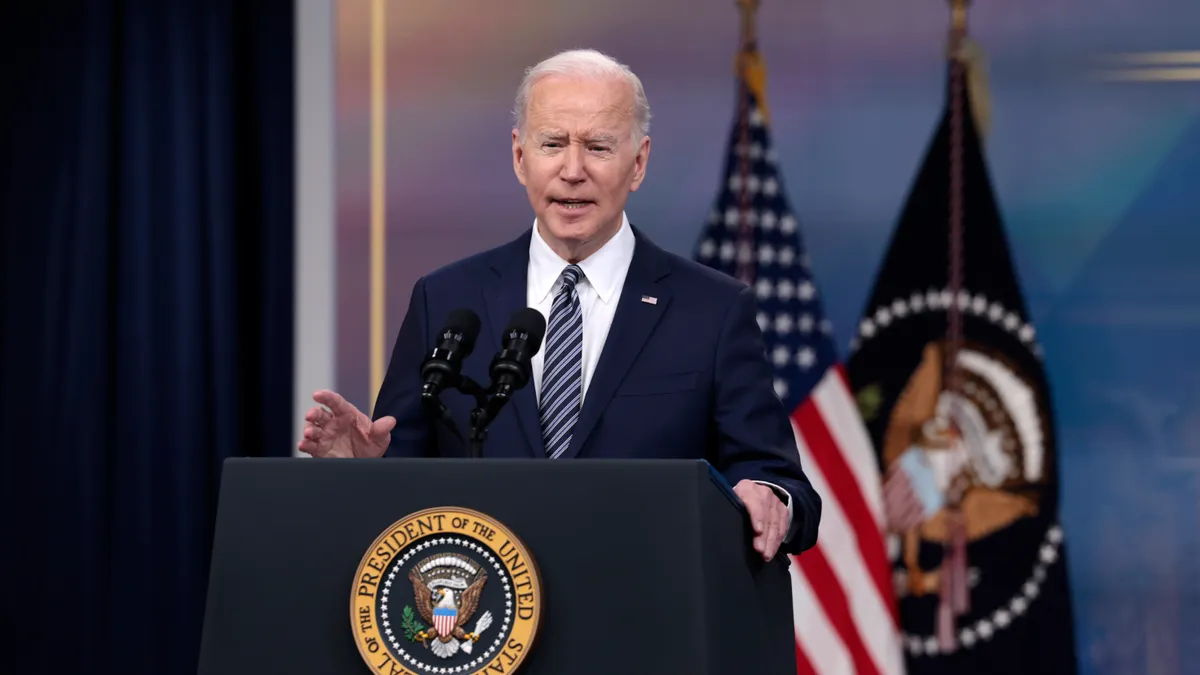Dive Brief:
- The Biden administration is calling for more regulation of cryptocurrencies, and wants agencies to step up enforcement actions against digital asset firms that harm consumers, according to a series of reports published Friday.
- In the reports, the administration recommends the Securities and Exchange Commission (SEC) and the Commodity Futures Trading Commission (CFTC) “aggressively pursue investigations and enforcement actions against unlawful practices in the digital assets space.” The reports also call for the Consumer Financial Protection Bureau (CFPB) and Federal Trade Commission to “redouble their efforts” to monitor consumer complaints and identify abusive practices in the sector. The Treasury Department will also head up an interagency group aimed at studying the implications of a central bank digital currency (CBDC), the White House announced Friday.
- The new framework follows an executive order Biden issued in March, in which he called on government agencies to explore the risks and benefits associated with the emerging crypto sector.
Dive Insight:
For the past six months, government agencies have been working to develop frameworks and policy recommendations that advance six priorities the White House identified in its March executive order: consumer and investor protection; promoting financial stability; countering illicit finance; U.S. leadership in the global financial system and economic competitiveness; financial inclusion; and responsible innovation.
In a joint statement Friday, National Economic Council Director Brian Deese and National Security Advisor Jake Sullivan said the recently released digital asset framework lays the groundwork for “a thoughtful, comprehensive approach to mitigating digital assets’ acute risks and — where proven — harnessing their benefits.”
“We remain committed to working with allies, partners, and the broader digital asset community to shape the future of this ecosystem,” Deese and Sullivan said in the statement.
Among several priorities identified in the report, the White House is considering calling on Congress to amend the Bank Secrecy Act (BSA) and laws against unlicensed money transmitting to apply explicitly to digital asset service providers, digital asset exchanges and nonfungible token (NFT) platforms, according to the White House fact sheet.
“[Biden] will also consider urging Congress to raise the penalties for unlicensed money transmitting to match the penalties for similar crimes under other money-laundering statutes and to amend relevant federal statutes to let the Department of Justice prosecute digital asset crimes in any jurisdiction where a victim of those crimes is found,” the White House said.
The Treasury Department will complete an illicit finance risk assessment on decentralized finance by the end of February 2023 and an assessment on nonfungible tokens by July 2023, the White House said.
Biden is also considering agency recommendations to create a federal framework to regulate nonbank payment providers, the White House said.
CBDC
The administration is encouraging the Federal Reserve to continue its ongoing research, experimentation and evaluation of a central bank digital currency (CBDC). Adding a digital dollar could help preserve U.S. global financial leadership, support the effectiveness of sanctions, facilitate faster cross-border transactions and promote financial inclusion, the White House said.
In addition to outlining the potential benefits, the White House acknowledged unintended consequences could include “runs to CBDC in times of stress,” and said further research and development is needed on the technology that would support a U.S. CBDC.
To support the Fed’s efforts, the Biden administration said the Treasury Department will lead an interagency working group to consider the potential implications of a U.S. CBDC, leverage cross-government technical expertise and share information with partners.
“The leadership of the Federal Reserve, the National Economic Council, the National Security Council, the Office of Science and Technology Policy, and the Treasury Department will meet regularly to discuss the working group’s progress and share updates on CDBC and other payments innovations,” the White House said.
Stablecoins
The administration said it will continue its efforts to evaluate digital assets’ stability risks, highlighting the crash of TerraUSD, an algorithmic stablecoin that lost parity with the U.S. dollar in May.
The crash led to a wave of insolvencies that erased nearly $600 billion in wealth, the White House said.
“Digital assets and the mainstream financial system are becoming increasingly intertwined, creating channels for turmoil to have spillover effects,” the White House said. “Stablecoins, in particular, could create disruptive runs if not paired with appropriate regulation.”
The Financial Stability Oversight Council (FSOC) will publish a report in October discussing the financial stability risks of digital assets and regulatory gaps, according to the Biden administration.
The Treasury Department will also work with other agencies and international allies to identify, track and analyze emerging strategic risks that relate to digital asset markets, the White House said.














